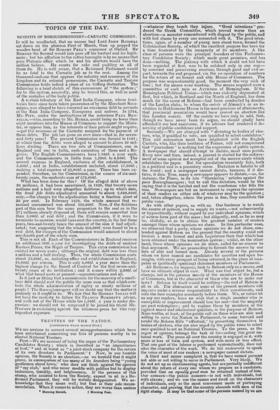TOPICS OF THE DAY.
BENEFITS OF BOROUGHMONGERY—CARNATIC COMMISSION.
IT will be recollected, that no sooner had Lord JOHN RUSSELL sat down on the glorious First of March, than up popped the wooden head of Sir ROBERT PEEL'S successor at Oxford. Sir ROBERT the Second would fain pass off his bastard zeal for legitimate; but his affection to the rotten boroughs is by no means that
pure Platonic affair which he and his abettors would have the million believe. He courts for cake and pudding as all of them do. He is well aware, that a Reformed Parliament would be as fatal to the Carnatic job as to the rest. Among the
thousand-and-one that oppress the industry and resources of the kingdom and its colonial possessions, the Carnatic and Tanjore Commission holds indeed a place of no trifling distinction. The following is a brief sketch of this excrescence of "the system ;" for to the system, assuredly, m-ay be traced this, as well as most of the maladies of the body politic.
A certain tributary of the East India. Company, whose territories have since been taken possession of by the Merchant Sovereigns, was alleged to have incurred an enormous debt to servants of the East India Company, Europeans and natives. In 1784,
Mr. PITT; under the instructions of the notorious PAUL BENFIELD,—who, according to Mr. BURKE, could bring no fewer than eight members into the House of Commons to support the Minis
ter, or oppose him, as the interests of their patron might require, —got the revenues of the Carnatic assigned for the payment of these debts. The job has gone on ever since—that is, for seven and-forty years! The present Commission was formed in 1805 ; at which time the debts were alleged to amount to above 30 millions sterling. There are two sets of Commissioners, one in England and one in India, each consisting of three and a Re gister. The English Commissioners have 1,500/. a year each, and the Commissioners in India from 3,200/. to 4,800/. The annual expense in England, exclusive of the establishment, is 5,0001.; and in India, establishment included, about 17,0001.; making a total expense of 22,000/. a year. There has been expended, therefore, on the Commission, in the course of six-andtwenty years, the moderate sum of 572,000/.
What has been done for this? Of the alleged debt of above 30 millions, it had been ascertained, in 1828, that twenty-seven millions and a half were altogether fictitious ; up to which date,
the bond fide debts adjudicated amounted to about 2,600,000/. only,—the charges for the adjudication being a fraction short of
20 per cent. In February 1828, the whole amount that re mained unexamined was about 268,000/. Now, if the fictitious part of this sum bear the same proportion to the real as in the 271 millions already disposed of, there will remain somewhat less than 3,000/. of real debt ; and the Commission, if it were to terminate to-morrow, would have cost the country, in the last three years, two-and-twenty times the amount of the sum it had adjudicated; but, supposing that the whole 268,000/. were found to be a real debt, the charges of the Commission would amount to about one-fourth-part of the whole sum.
This is not all. Each of the Commissioners in England receives an additional 300/. a year for investigating the debts of another Eastern Prince, the Rajah of Tanjore. This extra commission has .existed for seven years • although the original debt was less than a million and a half sterling. Thus, the whole Commission costs about 23,0001., or, including office and establishment in England, 24,000/. per annum. This is only 4,000/. a year more than the highest charge for the Board of Control for the first seven-andtwenty years of its institution ; and it comes within 2,000/. of what that board costs at present—superannuations and all.
Is it just or fitting that a commission for the recovery of a smallbeer debt should cost the public the same sum as that which controls the whole administration of eighty or ninety millions of people ? The Boronglimongers will no doubt say that the matter is precisely as it ought to be. We fear that Sir ROBERT INGLIS will not have the modesty to follow Sir FRANCIS BURDETT'S advice, and walk out of the House while his 1,800/. a year is under discussion: we should not be surprised if he joined his friend Mr. .DawsoN in exclaiming against the infamous press for this very imperfect exposure.


























 Previous page
Previous page